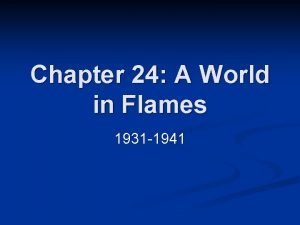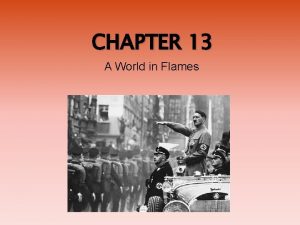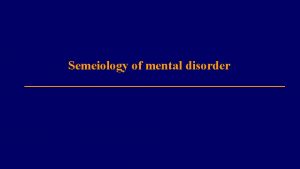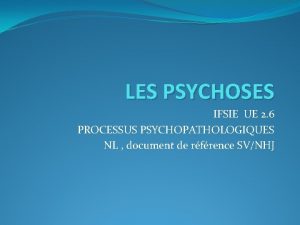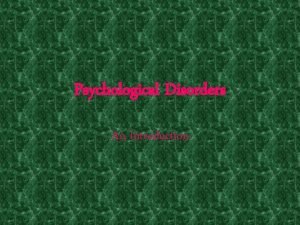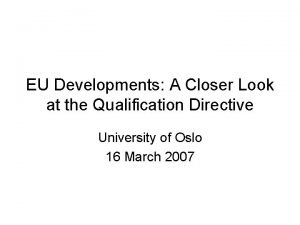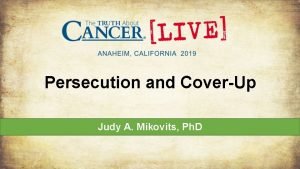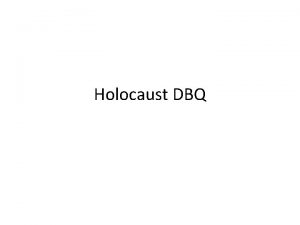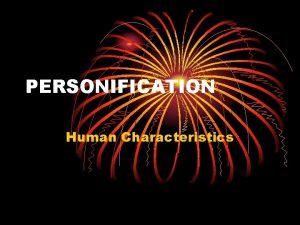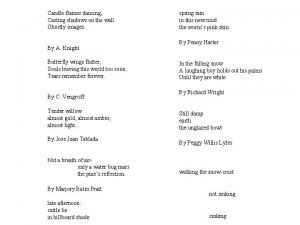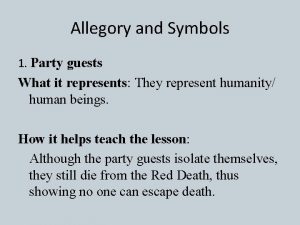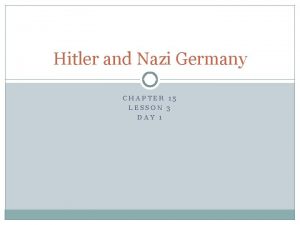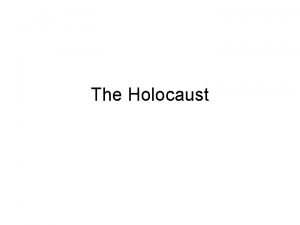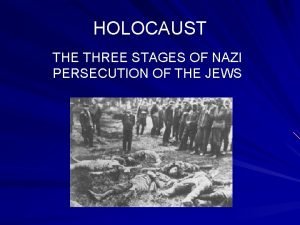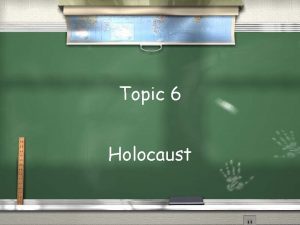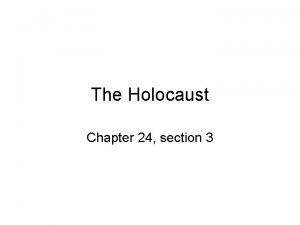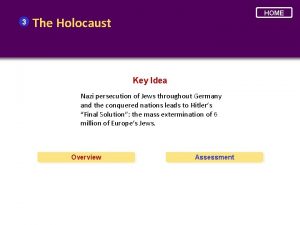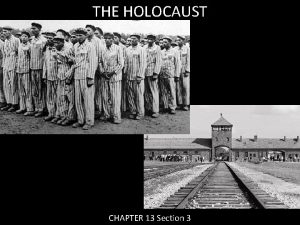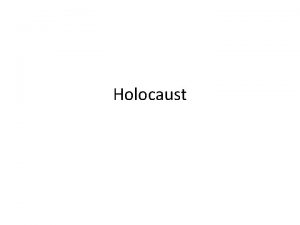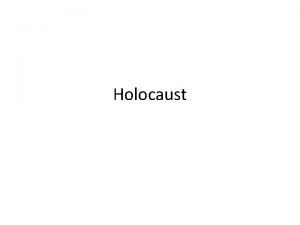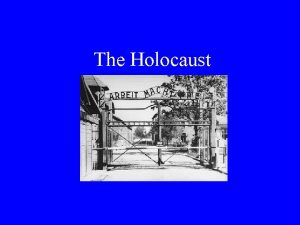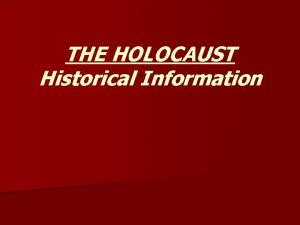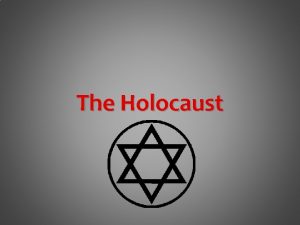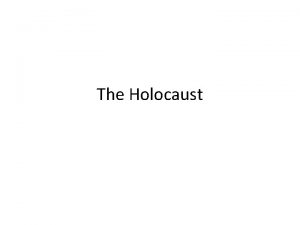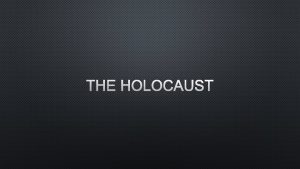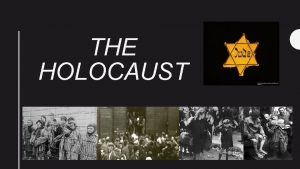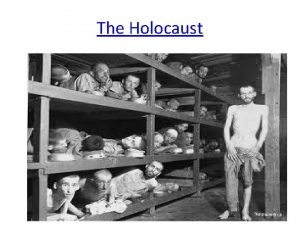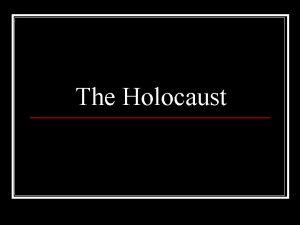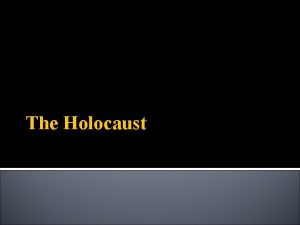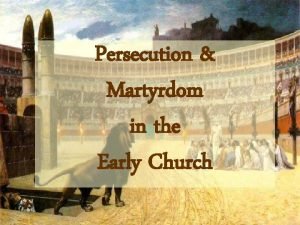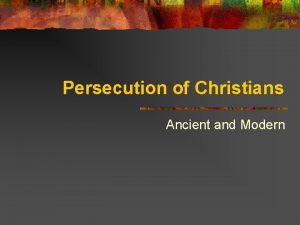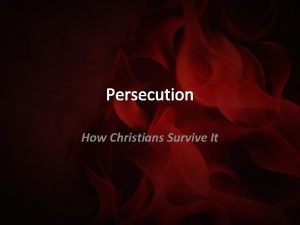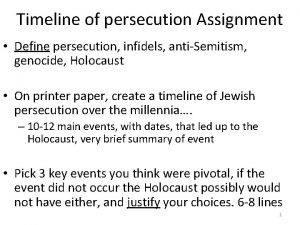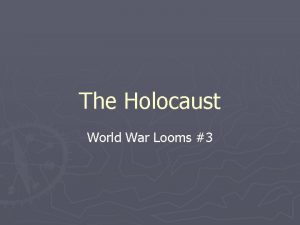A World In Flames THE HOLOCAUST Nazi Persecution


























- Slides: 26

A World In Flames THE HOLOCAUST

Nazi Persecution of the Jews �Holocaust: the catastrophe that ravaged Europe’s Jews �The Nazis killed nearly 6 million Jews

Nazi Ideology Once the Nazis took power in Germany, they acted swiftly to implement the political racial policies Hitler had outlined in Mein Kampf. The Nazis persecuted anyone who opposed them and also: The disabled, Gypsies, homosexuals, and Slavic peoples. The Nazis strongest hatred was towards the Jews. Even before the Nazis, the Jews had been a people who have been historically persecuted in Europe. The Nazis took the persecution to an unprecedented level.

The Nuremberg Laws In September 1935, the Nuremberg Laws took citizenship away from Jewish Germans and banned marriage between Jews and other Germans. Jews could not hold public office or vote Passports were marked with a big red “J” to clearly identify them By 1936 half of Germany’s Jews were jobless By 1938 Jews were banned from practicing law and medicine and from operating their own businesses

Kristallnacht: “night of broken glass” November 7, 1938 -Herschel Grynszpan (a Jew) shoots and kills a German diplomat in Paris. Hitler is angered and orders his minister of propaganda, Joseph Goebbels to stage attacks on Jews that look like spontaneous reaction to the news of the killing. November 9, 1938 -The plan plays out with anti- Jewish violence throughout Germany and Austria Businesses are destroyed with broken glass covering the streets Hitler extends the night over several days as 30, 000 wealthy Jews are arrested and ordered to give up their possessions and leave the country; Insurance payments to Jewish businesses are seized.

Jewish Refugees Try to Flee After Kristallnacht Jewish persecution increased and many went into hiding and/or tried to flee Germany. U. S. consulate office back-logged over 100, 000 visa applications Jews could only take about $4 out of the country Anne Frank SS St. Louis- a ship carrying 930 Jewish refugees sails to the United States and is turned away.

The “Final Solution” January 20, 1942 -Nazi leaders meet at the Wannsee Conference to determine the “final” solution to the “Jewish problem”. Concentration Camps: first established in 1933 to jail political opponents Jews provided slave labor Buchenwald Extermination Camps: built within some concentration camps specifically to mass murder (exterminate/genocide) the Jews. Gas chambers could kill 2000 people at a time/12, 000 in a day Auschwitz

The Holocaust 1939 -1945 Denmark: 500 Jews killed

The Holocaust 1939 -1945 Italy: 8, 000 Jews killed

The Holocaust 1939 -1945 Bulgaria: 14, 000 Jews killed

The Holocaust 1939 -1945 Yugoslavia: 26, 000 Jews killed

The Holocaust 1939 -1945 Belgium: 40, 000 Jews killed

The Holocaust 1939 -1945 France: 90, 000 Jews killed

The Holocaust 1939 -1945 The Netherlands: 105, 000 Jews killed

The Holocaust 1939 -1945 Russian USSR: 107, 000 Jews killed

The Holocaust 1939 -1945 Czechoslovakia: 155, 000 Jews killed

The Holocaust 1939 -1945 Germany and Austria: 210, 000 Jews killed

The Holocaust 1939 -1945 Baltic States: 228, 000 Jews killed

The Holocaust 1939 -1945 Belorussian USSR: 245, 000 Jews killed

The Holocaust 1939 -1945 Romania: 300, 000 Jews killed

The Holocaust 1939 -1945 Hungary: 450, 000 Jews killed

The Holocaust 1939 -1945 Ukrainian USSR: 900, 000 Jews killed

The Holocaust 1939 -1945 Poland: 3, 000 Jews killed

The Holocaust Despite exhaustive debate, there is still great controversy about why and how an event so horrifying as the Holocaust could have occurred. No consensus has been reached, but most historians point to a number of factors: The German peoples’ sense of injury after WWI Severe economic problems Hitler’s control over the German nation The lack of a strong tradition of representative government Germans’ fear of Hitler’s Secret Police A long history of anti-Jewish prejudice and discrimination

Essay Question Although no consensus has been reached for why an event so horrifying as the Holocaust could have occurred, give factors that most historians think could have contributed.

Essay Question Although no consensus has been reached for why an event so horrifying as the Holocaust could have occurred, give factors that most historians think could have contributed. The German people’s sense of injury after World War I; Hitler’s grip on the German nation; The lack of a strong tradition of representative government in Germany; German fear of Hitler’s secret police; And a long history of anti- Jewish prejudice and discrimination in Europe.
 A world in flames, 1931–1941
A world in flames, 1931–1941 Chapter 13 a world in flames
Chapter 13 a world in flames Apragmatisme
Apragmatisme Ideas of reference
Ideas of reference Délire de persécution
Délire de persécution Fugue state meaning
Fugue state meaning Persecution meaning
Persecution meaning Marc inc judy mikovits
Marc inc judy mikovits Délire de persécution
Délire de persécution 1 peter 3 enduring word
1 peter 3 enduring word Holocaust definition ap world history
Holocaust definition ap world history Calgary flames sponsors
Calgary flames sponsors Giving human characteristics to nonhuman things
Giving human characteristics to nonhuman things Flight planner chris
Flight planner chris Flame structure
Flame structure Introduction of gas welding
Introduction of gas welding A tomato flames
A tomato flames My maturity in flames
My maturity in flames Flames summer school
Flames summer school Does flames have shadows
Does flames have shadows Oaw welding process
Oaw welding process Eso extinguisher of flames
Eso extinguisher of flames Flames outline
Flames outline Tomato flames
Tomato flames Atomatoflames flaps
Atomatoflames flaps What do the tripods with flames represent
What do the tripods with flames represent Lesson 3 hitler and nazi germany
Lesson 3 hitler and nazi germany
